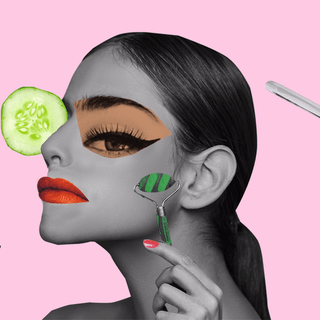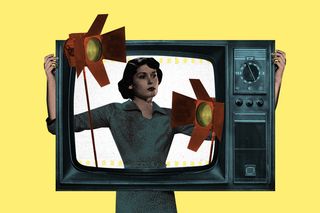
Is This Normal? “I Experience Life As if I’m Watching Myself in a Movie”
When you’re literally acting for an invisible audience every day, it’s easy to get caught up in observing yourself rather than experiencing life.

In this series, we dig into our strange phobias, fixations, and neuroses, and ask ourselves — Is This Normal?
Do you sometimes feel like your life is a movie — as if you’re watching yourself go through it instead of living it? Because I do. When I’m at a social gathering, I feel like I’m watching a “hangout show,” with myself starringin it. When I’m walking over to the neighborhood grocery shop, I feel as if my body is almost on auto-pilot while my mind watches me walk down the street. Perhaps, the time I feel the least like I’m in a movie is when I’m writing. But still, sometimes, instead of truly being present, I feel like I’m hovering near the ceiling, watching a Carrie Bradshaw-esque figure crouched on her sofa, typing fervently into her laptop.
Is this normal, or am I the only one who does this? While I don’t know the answer to the former, I do know that I’m certainly not the only person who feels this way.
“I’m constantly looking at my life as if I’m in a movie, or a song, or poem,” a Reddit user wrote in 2020. “I feel the music, cinematography, script, everything being played out as if it was a movie. Looking through a car window, causing drama, meeting strangers, all these little random things, it’s hard to describe.” There are multiple Quora threads too by individuals who feel quite the same way.
I wonder if social anxiety, something I live with, has something to do with this “movie-like” feeling surrounding my existence. Perhaps, being overtly focussed on how people are perceiving me makes me direct my gaze towards how I’m appearing to them — rather than, simply, being.
Interestingly, the phenomenon of individuals grossly overestimating the attention people are paying to their flaws is called the “spotlight effect.” Explaining why the effect manifests, Nathan Heflick, a senior lecturer of psychology at the University of Lincoln in the U.K., had written, “Basically, it is the result of egocentrism. We all are the center of our own universes. This is not to say we are arrogant or value ourselves more than others. Rather, our entire existence is from our own experiences and perspective [which we use to] evaluate other people’s thoughts and behaviors.”
Related on The Swaddle:
Is This Normal? “I Feel Like Someone Is Always Watching Me, Even When I’m Alone”
While this theory may help explain why I feel I’m just a character in a movie when in a public setting, it doesn’t explain why I feel that way when I’m working alone at home. But, looking back, I can trace a pattern: the more stressed or overwhelmed I am, the more common (and, on occasion, intense) the feeling of being in a movie becomes. Perhaps, it’s because I subconsciously want to escape the reality and believe I’m part of a narrative — the more familiar the better — with a fixed beginning and end. There is a sense of disassociation at the core of it.
“Dissociating is a natural response to high-stress situations… and exists on a spectrum,” an article on Mental Health America states. Mild dissociation often looks like daydreaming or zoning out — like when you’re scrolling through social media and suddenly notice four hours have passed. More intense dissociation may feel like you are observing yourself from outside of your body (depersonalization) or that the world is unreal (derealization).”
“Dissociative disorders” as a class of medical diagnosis; but people can independently experience dissociation too without suffering from the disorder — and as such, it’s pretty common. According to a 2004 study, temporary symptoms of depersonalization/derealization can manifest at a rate of 26-74% in a person’s general lifetime, and 31-66% at the time of a traumatic event.
“[It] often accompanies anxiety and depression — usually amplifying them… Most people experience it at some point, usually when exhausted after a long day or stressed. Smoking pot, or other psychedelic drugs, can also induce it,” Sophie from London, who lives with the depersonalization-derealization disorder, had told Dazed in 2016.
Further, during periods of acute stress, “the neurons in your brain fire more rapidly in certain areas… to help you act in a clearer and faster fashion, giving you that sense of ‘hypervigilance’ or super alertness,” an article on Contemporary Psychology explains. Is it the hypervigilance that lends one sort of a bird’s-eye perspective on their own life, causing them to feel as if they were simply watching themselves? Perhaps.
Related on The Swaddle:
Is This Normal? “I Imagine Friendships With Fictional Characters”
Moreover, I’m an autistic individual who has been “masking” her entire life. It is akin to playing a character that isn’t me — as “a survival strategy” to “fit in” so I could avoid being patronized, infantilized, pitied, ostracized, hated on, harassed, or bullied for being different. Consequently, I’m so focused on how I “appear” that I tend to lose track of how I’m “feeling”; causing me to feel detached from my own existence and focus more on how I “appear.” This cycle inevitably leads to the illusion of “watching” myself.
“When you’re acting all the time, you tend to get confused between the character you’re playing, and yourself. And the confusion about who you really cause a massive amount of anxiety,” A.B., 29, an autistic woman, had told The Swaddle last year. When you’re literally acting for a greater part of the day, every day, it’s easy to get so caught up in observing yourself rather than experiencing life.
Well, complete unmasking doesn’t seem like it’s going to be a reality anytime soon. And with the novel coronavirus so intent on constantly “improving” itself, it’s unlikely the stress and uncertainty we’re living in are going away anytime soon either.So, I can see myself being caught in this strange dichotomy for a while, at least — alongside many others, perhaps.
But to conclude with Sophie’s words, “It is annoying that depersonalization and derealization are such long and awkward words to use in conversation… that adds to the difficulty of talking about it.”
Devrupa Rakshit is an Associate Editor at The Swaddle. She is a lawyer by education, a poet by accident, a painter by shaukh, and autistic by birth. You can find her on Instagram @devruparakshit.
Related


It’s Okay: To Complain About Problems Without Trying to Fix Them
